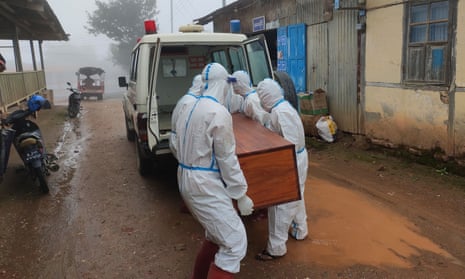Myanmar has reported what is believed to be its highest daily increase in Covid cases since the February coup, as concerns grow over the country’s collapsed health system and the junta’s continued crackdown on medics.
Myanmar’s Covid response was plunged into chaos when the military seized power on 1 February, detaining the elected government of Aung San Suu Kyi.
State hospitals are barely functioning, and a growing humanitarian crisis is unfolding across areas such as Kayah state, where the UN estimates a total of 100,000 people have been displaced by conflict.
Fears of a further wave of Covid cases have mounted over recent months, as new, more transmissible variants have spread in neighbouring countries such as India and Thailand. More than 3,000 people in Myanmar died during a previous outbreak in the country.
On Monday, state media announced that 546 new Covid infections and seven fatalities had been registered on 19 June, which is thought to be the highest increase since 1 February. It is not clear how many tests are being carried out, or how many people have been vaccinated.
Joy Singhal, Myanmar head of delegation at the International Federation of Red Cross and Red Crescent Societies, described the increase as deeply alarming. “It’s confirming our worries that the virus is spreading fast now that the more contagious and dangerous variants are being identified in various parts of the country,” Singhal said.
“Hospitals and the whole health system remain fractured and we need to urgently step up treatment, testing and prevention measures to avert a repeat of the tragedy experienced in other parts of South Asia,” he said.
The rise in cases comes as the junta continues its crackdown on healthcare workers. Last week, state media reported that the former head of the country’s Covid vaccination campaign, Dr Htar Htar Lin, had been arrested and faced several charges, including high treason, for working with pro-democracy politicians. Hundreds of medics are wanted for incitement.
Sandra Mon, a senior epidemiology researcher at the Center for Public Health and Human Rights at the Johns Hopkins Bloomberg School of Public Health in Baltimore, said it remained unclear how the junta planned to address the outbreak.
She urged the UN to call for the establishment of a no-fly zone in areas affected by conflict, which have registered infections. “We’re also seeing cases in ethnic areas where there’s a double burden of conflict and an increasing humanitarian crisis. Attempts to deliver medical supplies and equipment to these areas have been blocked by state security forces, which further cripples the response capacity there,” she said.
The possibility of bringing in a third party to manage vaccinations also needed to be considered, she added. Many healthworkers and civilians have rejected vaccinations offered by the junta, due to the deep mistrust of the security forces, which have killed 870 people since February.
“[The] best possible way forward at this point is some sort of medical emergency-based ceasefire in which the junta-Ministry of Health and Sport and NUG-Minsitry of Health come to an agreement for an apolitical covid response strategy,” said Mon, referring to the national unity government which was formed by pro-democracy politicians.
Almost 5,000 people are currently being held in detention, or have been sentenced by the junta, according to the advocacy group Assistance Association for Political Prisoners (Burma). This includes many health workers, who are no longer working in state hospitals, but are instead risking arrest to treat patients in secret, underground clinics, where supplies and equipment are limited. Doctors and nurses have also repeatedly warned they are being deliberately targeted by military violence.
Earlier this month, the health charity MSF said it had been ordered by authorities in Tanintharyi region to suspend activities in Dawei. The charity said the order “could be life-threatening for more than 2,000 HIV and tuberculosis patients” and that it was taking steps to minimise disruption.
